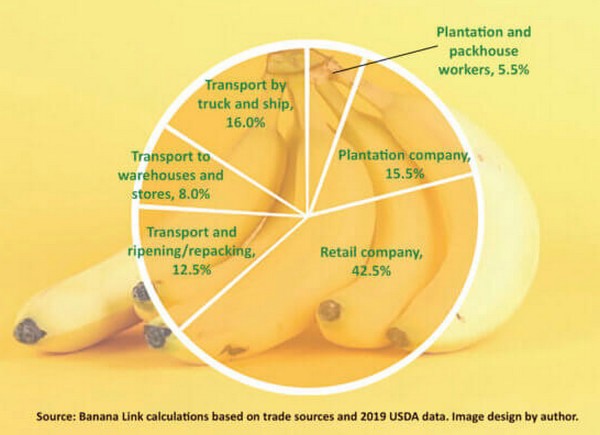According to a new report – What Difference Does a Union Make?: Banana Plantations in the North and South of Guatemala – published by the Center for Global Workers Rights at Penn State University in the US, there are stark differences in pay and working conditions for unionised and non-unionised workers in the Guatemalan banana industry.
Guatemala is currently the third largest exporting country of bananas in the world, and by far the largest exporter of bananas to North America, with two exporting areas: one on the southern Pacific coast, which is non-unionised and represents 85 percent of employment in the sector, and the other in the north where nearly all workers employed in banana plantations are unionised.
According to a Bananalink Press Release, the report, based upon a survey of over 200 workers (34% women), as well as extensive interviews, an examination of trade data, and a review of relevant prior research, found:
- Non-unionised workers earn less than half the hourly pay of unionised workers and work 12 hours per week more. Labour conditions are also more precarious for workers working for nationally-owned enterprises relative to enterprises directly owned by the big banana multinational brands.
- Non-union workers are 81 percent more likely to face verbal abuse than union workers. One of the most notable findings of the report being that 58 percent of women in non-union banana packing plants face sexual harassment at work compared to eight percent of women at unionised packing plants.
- All of the above labour rights violations take place at enterprises that are inspected by private certification programmes, including Global G.A.P. and Rainforest Alliance. At 25.5 percent of unionised workplaces and 85.9 percent of non-union workplaces, management tells workers what to say to the certification inspectors before the inspectors arrive.
The role of retailers
The report recognises that the root cause for the situation is the “mega supermarkets” who are able to use their buying power to constantly look for ways to squeeze down prices. This squeeze contributes to the push to find lower-cost production sites through outsourcing to local producers, who then squeeze labour through low wages, long hours of work, and an ever-increasing pace of production. The image below shows the distribution of value in the supply chain for Guatemalan bananas into the USA, with the retailers taking by far the largest slice, and workers the smallest.

The report states that Guatemalan labour law and enforcement mechanisms are in need of reform. Laws facilitating unionisation, increasing labour inspections, and creating stiffer penalties for violations that are paid in full are basic and necessary steps in this direction.
Click here to view the report 'What Difference Does a Union Make?'
